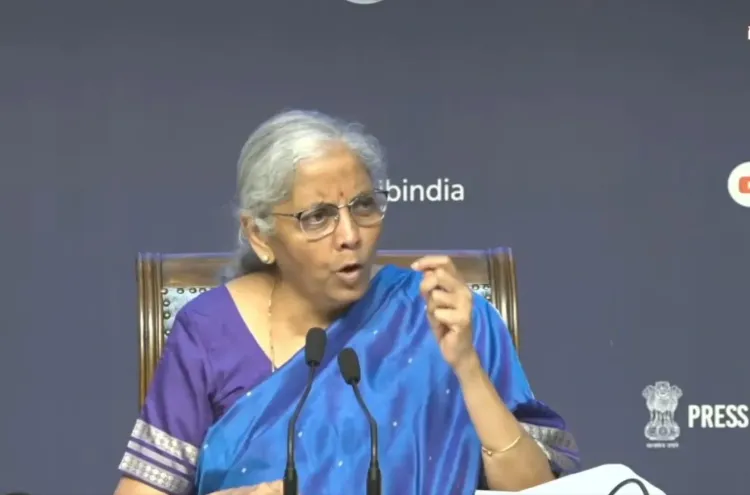Are GST reforms structural enough to benefit the middle class and farmers?

Synopsis
Key Takeaways
- GST reforms are structural, not just rate adjustments.
- Benefits aim to reach the middle class and farmers.
- Significant tax reductions on essential goods.
- Implementation date for new rates is September 22.
- Focus on empowering small businesses and enhancing self-reliance.
New Delhi, Sep 3 (NationPress) The recent GST reforms are not merely aimed at rationalizing rates but are fundamentally structural, claimed Finance Minister Nirmala Sitharaman on Wednesday. She emphasized that the decisions made by the GST Council were reached with unanimous agreement, with all ministers endorsing the rate adjustments.
According to her, in many instances, GST rates have significantly decreased, particularly benefiting farmers, agricultural sectors, and health-related products. This statement was made during a press conference following the conclusion of the 56th Meeting of the GST Council.
“Prime Minister Narendra Modi expressed a desire to swiftly extend the benefits of GST reductions to the populace. These reforms encompass not just rate rationalization but also structural changes. We have rectified the inverted duty structure,” stated FM Sitharaman.
The government has introduced comprehensive next-generation GST reforms designed to provide relief across numerous sectors, including daily essentials, healthcare, agriculture, education, automobiles, and appliances.
With tax reductions on a multitude of items, these reforms are set to enhance affordability, empower small enterprises, and bolster India’s self-reliance under the Aatmanirbhar Bharat initiative, according to the Finance Minister.
FM Sitharaman noted that “for items pertinent to the common man and the middle class, there is a complete reduction.”
A decision has been made to impose GST on the retail sale price (RSP) instead of the transaction value for products like pan masala, gutkha, cigarettes, unmanufactured tobacco, and chewing tobacco such as zarda.
Changes in GST rates for all goods, except for pan masala and tobacco products, will take effect from September 22.
The GST Council has recommended various measures to streamline trade.
FM Sitharaman revealed that a special rate of 40 percent will be applied solely to pan masala, cigarettes, gutka, and other tobacco products, with caffeinated and carbonated beverages also falling under this category.
Cars with engine capacities below 1200 cc and motorcycles under 350 cc will be taxed at 18 percent. Hair oil, soaps, bars, toothpaste, bicycles, and tableware will now face a 5 percent levy.
GST on agricultural products such as tractors and various machinery for soil preparation and harvesting has been reduced from 12 percent to 5 percent.









